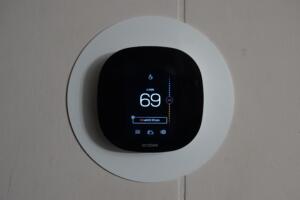It’s wintertime, and that means higher heating bills. But those bills don’t have to wreck your budget.
Here are a few simple steps you can take to save money on your winter utility bills.
Organize Your Rooms
If you have a forced-air heating system, make sure nothing is blocking your vents. These can include blankets or furniture. Baseboard vents should also be clear of furniture and low-hanging curtains.
An organized space aids in warm air flow, making it easier for a room to heat up. Not only will it take less time for a room to heat, unblocked air vents also allow your heater to run more efficiently.
Additionally, by removing clutter, furniture and curtains from in front of your heating unit, you are protecting yourself and your loved ones from potential fire hazards.
Isolate the Heat
Instead of heating the entire house, consider just heating up a single space.
You can heat your bed using an electric blanket under the fitted sheet or between your sheet and comforter. Doing so will keep you warm while maintaining a cooler temperature throughout the rest of the room.
Another option is to put a portable heater in your space. Some units work by heating coils and then dispensing the warm air with a van, much like a personal desk fan. Others, such as radiating heaters, work by heating large, exposed coils which radiate heat without the help of fan blades.
These portable heaters run off electricity rather than propane, so the units simply plug into the wall outlet.
Portable heaters are attractive for many homeowners because they are relatively safe to use. For example, most turn off and cool if they are tipped over. Others, like boxed heaters, feature enclosed heating coils that cannot be accidentally brushed up against.
Vary the Temperature
 Part of the reason winter bills get so high is because your heater is constantly running to maintain higher temperatures.
Part of the reason winter bills get so high is because your heater is constantly running to maintain higher temperatures.
Consider getting a programmable thermostat which allows you set the temperature you want your house to be at different parts of the day.
Try setting the thermostat to 68 degrees when you leave the house for work, then program the heater to kick on one hour before you get home. This way, your heater isn’t running while no one is home, and warmed up by the time someone is.
Another option is to set your thermostat to 68 degrees all day. Instead of raising the temperature at night, lower it and use some of the aforementioned tips to keep your room warm and toasty while you sleep.
Keep it Clean
You should your furnace or heat pump tuned up and your ducts cleaned and inspected.
If you have paper filters, change them seasonally. Or, more often if you live in areas with higher dust. If your filters are washable, wash them with warm soapy water seasonally.
A dirty filter means your furnace has to work that much harder, costing you money.
If your heating unit is older, it might be time to replace it. It could help you save money in the long-run. Contact your utility company to see if they offer any incentives or rebates on newer, more efficient appliances.
Look for Leaks
There are some inexpensive options you can use that help stop air leaks around windows and door frames and in turn, help you save money.
Weather stripping around outside doors, and caulk around window edges, help block out that cold air. In homes that have window unit air conditioners, it is likely that homeowners are losing money in the winter because the edges around the unit cannot be properly sealed.
Consider removing the AC unit during the winter months and replacing it in the spring to save a little bit.
Also look into adding extra insulation in your attic. Since warm air rises, it is essential to make sure none of that warm air is escaping through the roof.
Contact Your Utility Provider
Some utility providers offer budget payment plans that take those high seasonal bills and spread them out over the year.
Though the dollar amount is not reduced in total, it does make it easier to budget each month.
Another service utility companies often provide is a free home inspection which can assess your home’s energy efficiency and give you tips on how to make it more cost effective.
And remember, home improvements such as a programmable thermostat, better insulated attic, and air leak prevention will assist with cooling in the summer, and help provide you with year-round savings!

